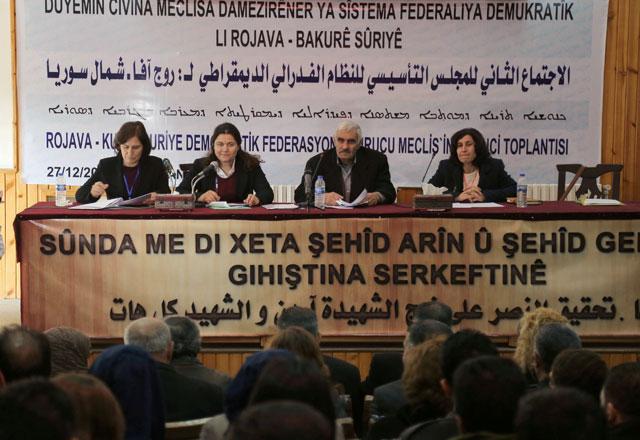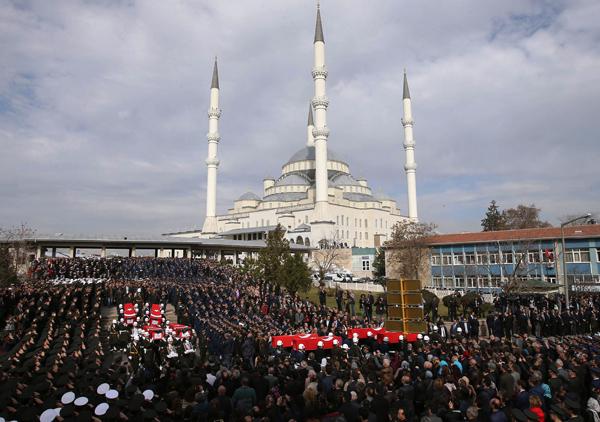You are here
Syrian Kurds, allies set to approve new gov’t blueprint
By Reuters - Dec 28,2016 - Last updated at Dec 28,2016

Hadiya Yousef (right) and other delegates take part in a conference in Syria's Kurdish-controlled northern regions in the town of Rmeilan, Hasakeh province, Syria, on Wednesday (Reuters photo)
BEIRUT — Syrian Kurdish groups and their allies are expected to approve a blueprint for a system of federal government in northern Syria this week, Kurdish officials said, reaffirming their plans for autonomy as Russia and Turkey seek to revive diplomacy.
The aim is to cement the autonomy of areas of northern Syria where Kurdish groups have already carved out self-governing regions since the start of the war in 2011, though Kurdish leaders say an independent state is not the goal.
Increasing Kurdish influence in northern Syria has alarmed neighbouring Turkey, while the United States also opposed the federal plan first announced in March. President Bashar Assad also opposes federalism.
The blueprint amounts to a constitution, known as the social contract, and is expected to be approved on Wednesday or Thursday at a meeting of a 151-member council in the city of Rmeilan, according to Hadiya Yousef, who chairs the council.
"I expect ratification because we have discussed the content with all groups and political sides repeatedly, and the draft was worded with consensus," she said in a written message to Reuters.
"We will clarify through the contract ... the means for starting the formation of our institutions and administrative system, and we will start preparations for elections," she added. The first elections would be to regional administrations, to be followed by an election to a central body.
The council, a constituent assembly which officials say includes members of all the main political, ethnic and religious groups in the area, began meeting on Tuesday.
Unilateral moves by Syrian Kurdish groups and their allies have taken place against a backdrop of international failure to promote a political settlement to a Syrian war nearing its sixth anniversary.
Russia, Iran and Turkey said last week they were ready to help broker a peace deal in Syria after meeting in Moscow, where they adopted a declaration setting out the principles any agreement should adhere to.
Arrangements for the talks, which would not include the United States and be distinct from separate, intermittent UN-brokered negotiations, remain hazy, but Moscow has said they would take place in Kazakhstan, a close ally.
Iran and Russia have given Assad crucial military backing in the war against rebel groups fighting him in western Syria. Turkey has been a major backer of the rebels.
The effort to revive the diplomatic track follows the defeat of Syrian rebels in eastern Aleppo — Assad's biggest victory of the war. The main Syrian Kurdish militia, the YPG, has mostly avoided conflict with Assad, while serving as the military backbone of the autonomous Kurdish regions.
The YPG is the dominant force in the Syrian Democratic Forces alliance that has seized swathes of territory from the Daesh terror group in a US-backed campaign in Syria.
Kurds ready to take part in talks
Another Kurdish politician said groups signing up to the new constitution were not ruling out involvement in future peace talks, but they had not been invited to a meeting in Kazakhstan.
"We are ready to negotiate in any regional or international meeting, to propose our plans and our vision for a solution in Syria," said Fawza Ahmad, a member of the constituent council, speaking to Reuters from the meeting. She noted that Kurdish groups were excluded from previous UN-backed talks on Syria.
Turkey views the main Syrian Kurdish Party, the PYD, as an extension of the Kurdistan Workers Party (PKK), which has waged a three-decade insurgency for Kurdish autonomy in southeastern Turkey.
Turkey launched a military incursion into northern Syria in August in large part to prevent the YPG from gaining further ground and linking Kurdish regions in northeastern Syria with a pocket of Kurdish-controlled territory in northwestern Syria.
Some 30 million Kurds are estimated to live in Iran, Turkey, Iraq and in Syria. Kurdish groups have enjoyed autonomy in northern Iraq since the 1990s.
The Kurdish name for northern Syria, "Rojava", was dropped from the name of the proposed system of government, said Nasreddin Ibrahim, another Kurdish politician at the meeting. He said that had led 12 Kurdish parties to express reservations, but would not obstruct ratification of the document.
Related Articles
BEIRUT — The Kurdish-led administration in northern Syria has set dates for local council and regional assembly elections, an official said
BEIRUT — The future of Kurdish-led areas of northern and eastern Syria has been thrown into doubt by President Donald Trump’s decision to wi
ANKARA — Turkey has pinned the blame for a deadly attack in Ankara on Syrian Kurdish fighters — but its assertions have been greeted with sc


















